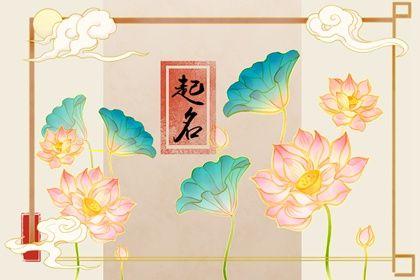究竟怎样运用成语为孩子起好名字呢
- 作者: 郭初温
- 来源: 投稿
- 2024-07-26
一、究竟怎样运用成语为孩子起好名字呢
运用成语为孩子起好名字的技巧
1. 寓意深刻:选择寓意吉祥、美好、有内涵的成语,如“德才兼备”、“学富五车”、“才华横溢”。
2. 朗朗上口:名字要读起来顺口、悦耳,避免生僻字或拗口字。如“文博”、“雅静”、“思远”。
3. 符合性别:成语中有些字词具有明显的性别倾向,如“英”、“豪”适合男孩,“淑”、“婉”适合女孩。
4. 避免谐音:注意成语的谐音,避免产生不雅或不吉利的含义。如“一鸣惊人”谐音“一鸣惊魂”。
5. 结合姓氏:名字要与姓氏搭配和谐,避免出现生硬或不协调的情况。如“王德才”、“李学富”。
6. 考虑字形:名字的字形要美观大方,笔画不宜过多或过少。如“文”、“雅”、“思”。
7. 寄托期望:父母可以通过成语来表达对孩子的期望和祝福,如“志远”、“博文”、“思齐”。
8. 借鉴古人:可以参考古代名人的名字,从中汲取灵感。如“诸葛亮”、“李白”、“苏轼”。
9. 结合生肖:根据孩子的生肖,选择与之相配的成语,如“龙腾虎跃”、“兔跃龙门”、“蛇舞九天”。
10. 避免重复:尽量避免使用过于常见的成语,以免名字缺乏个性和新意。
示例:德才兼备:德文、才轩
学富五车:博文、书涵
才华横溢:文博、雅静
志存高远:志远、思齐
龙腾虎跃:龙腾、虎跃
二、究竟怎样运用成语为孩子起好名字呢英语
How to Use Idioms to Give Your Child a Good Name in English
1. Choose an idiom that reflects your child's personality or aspirations.
For example, if your child is bright and cheerful, you might choose the idiom "a ray of sunshine." If your child is strong and determined, you might choose the idiom "a force of nature."
2. Make sure the idiom is appropriate for a child.
Some idioms are more suitable for adults than for children. For example, the idiom "a pain in the neck" would not be a good choice for a child's name.
3. Consider the sound of the idiom.
The idiom should sound pleasing to the ear. You don't want to choose an idiom that is too harsh or difficult to pronounce.
4. Be creative.
You don't have to use the idiom exactly as it is written. You can change the order of the words or add or remove words to create a unique name.
5. Get feedback from others.
Once you have chosen an idiom, ask friends and family for their feedback. They can help you make sure that the name is appropriate and sounds good.
Here are some examples of English names that are based on idioms:
Aiden (from the idiom "aiden's eye")
Aurora (from the idiom "the aurora borealis")
Celeste (from the idiom "celestial bodies")
Destiny (from the idiom "destiny's child")
Everest (from the idiom "to climb mount everest")
Harmony (from the idiom "in harmony")
Phoenix (from the idiom "to rise from the ashes")
Seraphina (from the idiom "seraphim angels")
Valor (from the idiom "valor and courage")
Zenith (from the idiom "to reach the zenith")
These are just a few examples of how you can use idioms to give your child a good name in English. With a little creativity, you can find an idiom that is perfect for your child.

三、究竟怎样运用成语为孩子起好名字呢视频
如何使用成语为孩子起好名字
视频教程步骤 1:选择有意义的成语
考虑孩子的性格、愿望或家庭价值观。
选择反映这些品质的成语。
例如,对于一个聪明、有创造力的孩子,可以考虑“才华横溢”或“学富五车”。
步骤 2:提取关键字从成语中提取代表其含义的关键字。
例如,从“才华横溢”中提取“才”和“溢”。
步骤 3:组合关键字将关键字组合成一个有意义的名字。
例如,“才溢”或“溢才”。
步骤 4:考虑发音和含义
确保名字发音悦耳,含义吉祥。
避免使用生僻字或含义负面的成语。
步骤 5:检查重名在起名之前,检查是否有重名。
可以使用在线重名查询工具或咨询户籍部门。
示例成语:学富五车
关键字:学、富
名字:学富、富学
成语:才华横溢
关键字:才、溢
名字:才溢、溢才
提示
可以使用成语词典或在线资源查找合适的成语。
考虑孩子的性别和姓氏,选择合适的成语。
起名时不要过于复杂或生僻,以免影响孩子的日常生活。
最重要的是,选择一个有意义、吉祥的名字,陪伴孩子一生。
四、用成语起名字的都有哪些好的成语
吉祥如意吉祥如意
福寿安康
万事如意
心想事成
百事亨通
才华横溢
才华横溢
学富五车
博学多才
聪明伶俐
智慧过人
品德高尚
品德高尚
仁义道德
诚实守信
谦虚谨慎
尊老爱幼
事业有成
事业有成
蒸蒸日上
前程似锦
大展宏图
如日中天
家庭和睦
家庭和睦
夫妻恩爱
子孙满堂
天伦之乐
阖家欢乐
健康长寿
健康长寿
延年益寿
福如东海
寿比南山
长命百岁
其他
沉鱼落雁
闭月羞花
惊才绝艳
出类拔萃
鹤立鸡群




